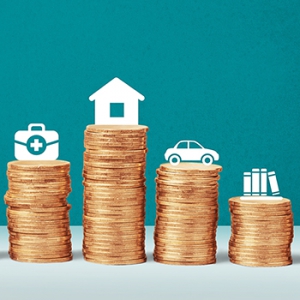Now that your kids have a better understanding of what debt is, we’ll begin to help them grasp the emotional effects of debt. Helping your children to understand this now could help prevent not only future financial stress as they grow older — but also avoid mental and emotional stress.

Why this financial life lesson is so important
If a mortgage was all our kiddos needed to learn about when it comes to debt, we could wrap up the lessons right here — it generally makes sound financial sense to borrow money to buy a house, and everyone needs a place to live. The same goes for other things necessary to work and live our lives.
However, many people get in over their heads. Some people borrow money to buy a car much fancier than they need and more costly than they can afford. The same goes for luxury clothes, an upgraded smartphone, or even Christmas gifts. This is about when the emotional effects of debt start settling in, causing stress and anxiety.
Here’s an example of a conversation you could have to help you teach your kids the downside of accumulating debt, especially for things they cannot reasonably afford.
Starting the conversation about the emotional effects of debt
“Every time you borrow money, you enter another promise to pay. And… you must pay more than you borrowed in the end. Through interest, remember?”
“Since you are borrowing money today that you don’t have in hand, you must pay it back with money you will receive in the future. Therefore, the money that “you will get but don’t have yet” is already promised to someone else — you can’t use that money yourself! So, by getting into more debt, you have stolen the opportunity away from yourself to Give, Save or Live on that amount. It then becomes harder and harder to reach your goals.”
Ask your kids: how does this make you feel?
 Now, say to your kids: “when you borrow, you steal from tomorrow.”
Now, say to your kids: “when you borrow, you steal from tomorrow.”
Continuing the conversation: “How does that sentence make you feel? Remember when we talked about the definition of rich? We agreed that rich relates to having breathing room, which you could also say is the difference between income and expenses. And the more debt you have, the more expenses you have. The more expenses you have, the less breathing room you have. The less breathing room you have, the less safe you feel emotionally.
Your kids may say “But buying things now makes me feel good now!” to which you can respond “Yes, but you will not feel good about the decision when you lose breathing room in the future.”
Fun Factor: Use Monopoly money to illustrate what happens to your future income when you incur more debt.
Help your kids to understand when debt is, or is not, necessary
Your kids may start to think that all debt is evil and bad, but this isn’t the case. You can explain to them that If they understand the definition of rich, they will: consider the opportunity costs, know what their budget goals are, and will consider that borrowing steals from tomorrow. As a result of that understanding, they will usually decide not to borrow. They will realize that based on past experiences and their future hopes and dreams — that they have chosen wisely.

For parents
If today’s lesson seemed to be a bit of a rant, I have to say that it is! The problem with debt is not the individual or entity loaning the money, or even the idea of leveraging debt. The problem lies with discipline. If our kids do not learn to confront the decision to take on debt in this way, the discipline will be hard to come by. We’re building a process together with our kids — constructing a system and set of beliefs that will help our children navigate financial decisions. A huge part of that equation is debt… and how we view it.
December 2019
